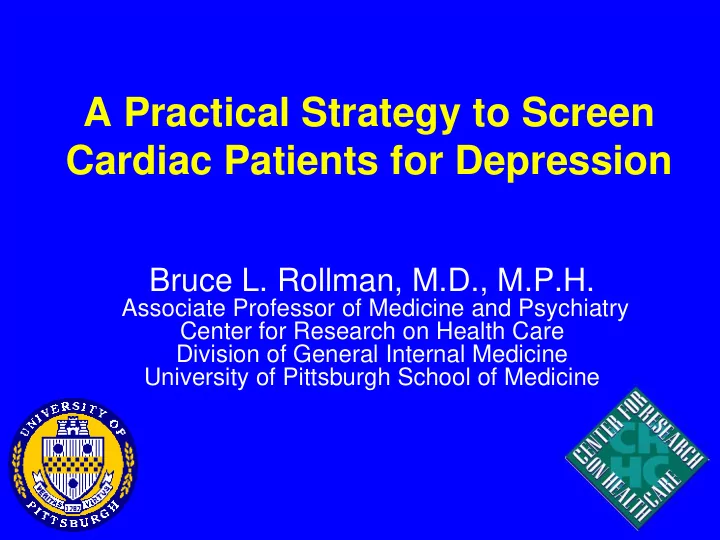

A Practical Strategy to Screen Cardiac Patients for Depression Bruce L. Rollman, M.D., M.P.H. Associate Professor of Medicine and Psychiatry Center for Research on Health Care Division of General Internal Medicine University of Pittsburgh School of Medicine
Presenter Disclosure Information Bruce L. Rollman, MD, MPH The following relationships exist related to this presentation: Travel support: American Psychosomatic Society Grant support: NHLBI R01 HL70000
Rex Morgan, M.D.
Depression • Affects 16-35% of patients with CVD • Mortality associated with post-MI depression is =/> than any medical predictor of risk • Seldom diagnosed and rarely treated in cardiac patients • Failure to recognize is a failure to provide the best care for our patients Rumsfeld JS. Circulation . 2005; 111:250-253
What is Major Depression? For at least 2 weeks: 1) Depressed mood most of the day and/or 2) Markedly diminished interest or pleasure 3) 3-4+ of the following: • Sleep disturbance • Fatigue nearly every day • Feelings of worthlessness or guilt • Decreased concentration • Significant weight loss/gain • Psychomotor agitation/retardation • S uicidal ideation American Psychiatric Association, 1994
Impact of Depression Post-MI 6-Month Mortality: – 17% depressed vs. 3% nondepressed – Univariate hazard ratio of depression: 5.7 (4.6-6.9) Frasure-Smith N. JAMA 1993; 270:1819
Impact of Depression Post-MI Welin C. J Intern Med 2000; 247:629
Impact of Depression Post-MI Mortality Following MI (N=896): Lesperance F. Circulation 2002; 105:1049-53
Impact of Depression on CHF 12-Month Mortality No Depression Mild Depression Major Depression (vs. No Depression Adj. RR: 1.4; (1.03-2.01) Jiang W. Arch Intern Med 2001; 161:1849-56
Impact of Peri-CABG Depression • 16-47% pre/post-operative prevalence • 50% symptomatic up to 3 years later • Associated with higher rates of hospital readmission, cardiac events, and death
How Depression May Affect CAD Lett HS. Et. al. Psychosom Med. 2004; 66:305-15
Bypassing the Blues: A Study to Improve the Quality of Life Following Cardiac Bypass Surgery R01 HL70000: 7/1/03-6/30/08 PI: Bruce L. Rollman, M.D., M.P.H. Associate Professor of Medicine and Psychiatry University of Pittsburgh School of Medicine Co-PI: Charles F. Reynolds, III, M.D. Professor of Psychiatry and Neuroscience University of Pittsburgh School of Medicine Site-Principal Investigators Jefferson Regional Sang B. Park, M.D. Mercy Hospital Heart Inst. V. Krishnaswami, M.D. UPMC-Passavant Bradley S. Taylor, M.D. UPMC-Presbyterian Peter J. Counihan, M.D. UPMC-Shadyside V.R. Machiraju, M.D. VA Medical Center Mark A. Wilson, M.D., Ph.D. Westmoreland Regional Mark M. Suzuki, M.D. West Penn Allegheny Hospital Michael H. Culig, M.D.
Treatment of Depression Following Bypass Surgery Objectives: To examine if treating depression improves HRQoL and functional status, and decreases cardiovascular morbidity, depressive symptoms and health care costs s/p CABG; To identify predictors for post-CABG depression; To study the effect of depression and our intervention on subgroups defined by age, sex, race, and co- morbid illness.
Bypassing the Blues Design: Randomized effectiveness study. Setting: 8 Pittsburgh-area hospitals. Patients: 300 Depressed (PHQ- 9 ≥ 10) randomized to Inter. vs. “Usual Care” 2-weeks post-CABG; & 150 Non-depressed “control patients.” Intervention: Phone-based collaborative care. Follow-up: 8-44 months.
Bypassing the Blues Study Design
Patient Health Questionnaire (PHQ-2) In the past two weeks , have you had: • Little interest or pleasure doing things? • Feeling down, depressed, or hopeless?
PHQ-2 Major Depression Sensitivity Specificity Primary care patients Past 2 weeks, ≥1 vs. 0 98% 59% Kroenke K. Med Care 2003; 41:1284-92 Cardiac patients Past month, ≥1 vs. 0 90% 69% McManus D. Am J Cardiol 2005; 9:1076-81
Recruitment – To Date
PHQ-9 Kroenke K. J Gen Intern Med 2001; 16:606-13
PHQ-9 Major Depression Sensitivity Specificity Primary care patients Past 2 weeks, ≥10 vs. <10 88% 88% Kroenke K. J Gen Intern Med 2001;16:606- 613 Cardiac patients Past 2 weeks, 54% 90% ≥10 vs. <10 McManus D. Am J Cardiol 2005; 9:1076-81
Outpatient Recruitment – To Date
Baseline Sociodemographics Trial Control P N=231 N=142 Age (SD) 63.7 (10.8) 66.2 (9.8) .02 Male 59% 63% .52 Caucasian 91% 82% .07 Marital status 8% 8% Single 66% 69% .82 Married 26% 23% Sep/Div/Widowed Working 37% 42% .33
Clinical Characteristics Trial Control P N=231 N=142 Hypertension 82% 79% .48 Diabetes 44% 39% .37 CHF 17% 19% .53 Smoked, past year 28% 14% .002 Hyperlipidemia 77% 71% .17 MI, prior 42% 41% .89
Surgical Characteristics Control Trial P N=142 N=231 CABG type: 84% 80% Conventional 3% 4% .65 Minimally invasive 13% 16% Off-pump Graft #, median 3 4 .63 CABG type: 74% 77% CABG 8% 2% .05 CABG redo 18% 21% CABG + procedure Cross-clamp time, 71 69 .68 minutes, median
Baseline Mental Health Trial Control P N=231 N=142 PHQ-9 (SD) 13.7 (3.5) 1.8 (1.4) <.001 SF-36 MCS (SD) 42.9 (11.4) 61.5 (6.0) <.001 SF-36 PCS (SD) 30.3 (6.8) 37.4 (7.6) <.001 Hx of Depression 41% 5% <.001 On SSRI/SNRI 20% 0% <.001
Why Bother to Screen and Treat Depressed Patients with CAD? Pharmacologic treatment of depression may reduce cardiovascular morbidity. Depression adversely impacts health-related quality of life and may lead to suicide. Effective treatments are available that can be initiated by non-psychiatrists.
Depression: To Screen or Not to Screen American College of Cardiology and the American Heart Association guidelines recommend evaluation for symptoms of depression and consideration of treatment for patients with: - Acute MI - Chronic angina - CABG surgery Circulation 2005; 111:250-53
Patient Health Questionnaire (PHQ-2) In the past two weeks , have you had: • Little Interest or pleasure doing things? • Feeling down, depressed, or hopeless?
Further Information • The Epidemiology, Pathophysiology, and Management of Psychosocial Risk Factors in Cardiac Practice. Rozanski A. et. al. J Am Coll Cardiol 2005; 45:637-51. • Depression and Cardiovascular Disease: A Call for Recognition. Rumsfeld JS and Ho PM. Circulation . 2005; 111:250-253. • Assessment and Treatment of Depression in Patients with Cardiovascular Disease: NHLBI Working Group Report. Davidson, KW et. al. Psychosomatic Med 2006; 68:645-50. • www.depression-primarycare.org McArthur Foundation Initiative on Depression (toolkit, PHQ)
Recommend
More recommend